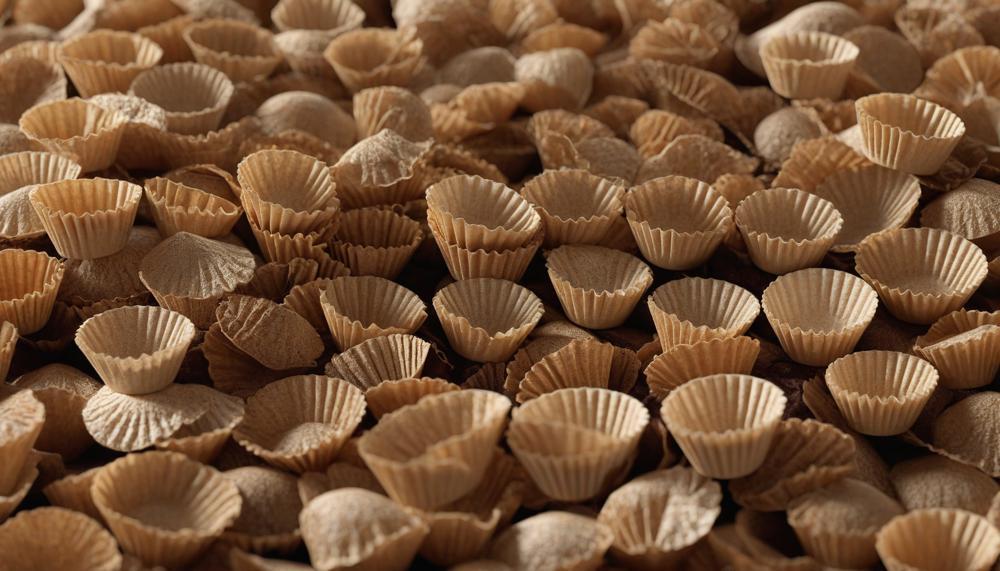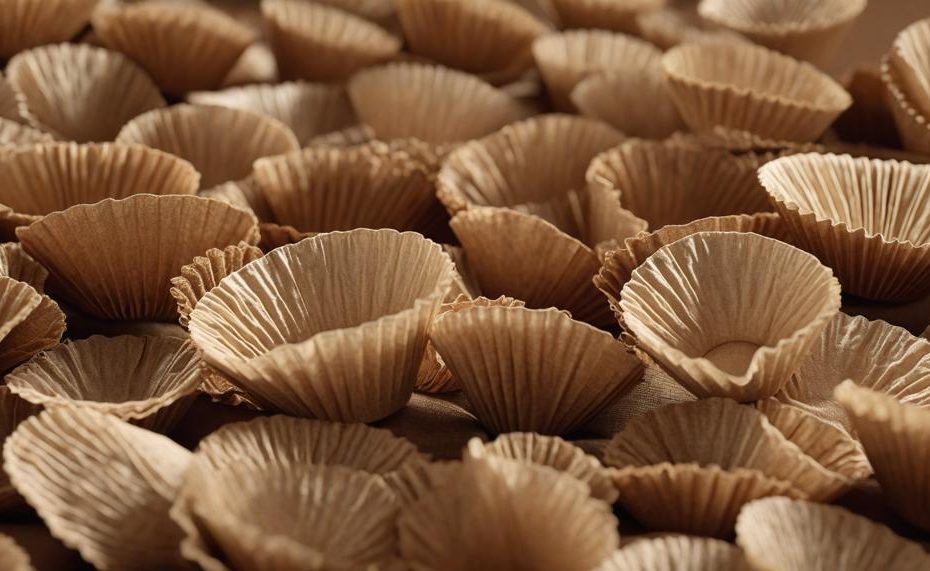Yes, coffee filters can be biodegradable, but it depends on the type. As the world shifts towards sustainable living, understanding the environmental impact of everyday items, like coffee filters, becomes crucial. Let’s break down the key points:
- Paper Filters: These are usually made from unbleached or bleached paper. Unbleached paper filters are biodegradable and compostable, breaking down naturally over time. Bleached paper filters, however, contain chemicals that may hinder the biodegradation process.
- Cloth Filters: Made from natural fibers like cotton or linen, cloth filters are also biodegradable but take longer to decompose than paper. They are reusable, reducing waste and environmental impact over time.
- Metal Filters: Typically made from stainless steel or gold-plated mesh, metal filters are not biodegradable. However, their reusability makes them a sustainable choice, reducing the need for disposable filters.
Key Takeaways:
- Environmental Impact: Choose unbleached paper or cloth filters to minimize chemical pollution and enhance biodegradability.
- Disposal Methods: Compost paper and cloth filters to ensure they break down naturally. Recycle metal filters when they are no longer usable.
- Sustainable Options: Reusable cloth or metal filters reduce waste and are eco-friendly alternatives to single-use paper filters.
Understanding the biodegradability of coffee filters helps in making informed decisions that support environmental sustainability. Dive deeper to learn more about the best choices for your daily coffee ritual and the planet.
Contents
- 1 Bleached Vs Unbleached Filters
- 2 Are Other Coffee Machine Filters Compostable?
- 3 Are Coffee filters bad for the environment?
- 4 How long do coffee filters take to decompose?
- 5 How To Compost Coffee Filters
- 6 Do Coffee Filters Contain Plastic?
- 7 Are Coffee Filters Recyclable?
- 8 Are Coffee Filters Biodegradable?
- 9 Conclusion
Bleached Vs Unbleached Filters
The primary difference between bleached and unbleached coffee filters lies in their processing. Bleached filters are whitened through chemical processes, typically using chlorine or oxygen-based agents, whereas unbleached filters retain their natural brown color and undergo minimal processing.
This distinction impacts their biodegradability in the following ways:
| Filter Type | Processing Method | Impact on Biodegradability |
| Bleached Filters | Whitened using chemicals such as chlorine or oxygen-based agents. |
|
| Unbleached Filters | Minimal processing, retain natural brown color. |
|
Taste Considerations:
- Some users find bleached filters offer a cleaner taste, potentially free from any papery residue.
- Unbleached filters might require rinsing before use to remove any residual taste.
Environmental Impact:
- Bleached Filters: Although biodegradable, they can leave chemical residues that may affect the compost quality and the environment.
- Unbleached Filters: Being less processed, they are a more sustainable option with fewer environmental repercussions.
For more eco-friendly coffee brewing, consider using reusable filters made from cloth or metal, which significantly reduce waste and can be used multiple times.
Are Other Coffee Machine Filters Compostable?
Yes, other coffee machine filters are compostable besides paper filters.
Compostable Coffee Machine Filters:
- Cloth Filters: These filters, often crafted from organic cotton or hemp, can be washed and reused multiple times. Once they wear out, they can be added to your compost pile, breaking down naturally over time.
- Bamboo Filters: Bamboo is a highly renewable resource that grows quickly without the need for pesticides. Bamboo coffee filters decompose naturally and can be tossed into the compost bin after use.
- Unbleached Paper Filters: Unlike their bleached counterparts, unbleached filters do not undergo chemical processing, making them safer for the compost heap. They are made from natural paper and break down efficiently.
- Biodegradable Plastic Filters: These filters are made from polylactic acid (PLA) derived from corn starch or sugarcane. They are designed to degrade in industrial composting conditions, making them a suitable eco-friendly option. However, ensure they are labeled as compostable to avoid confusion with regular plastic filters.
By opting for these compostable filters, you contribute to reducing waste and promoting a healthier environment.
Are Coffee filters bad for the environment?
Coffee filters can negatively impact the environment, especially if not disposed of responsibly. The main issues are the landfill clogging and the non-recyclable nature due to coffee oils. However, their environmental footprint can be mitigated with appropriate disposal methods.
Impact of Coffee Filters on the Environment
- Landfill Clogging: Paper coffee filters, when thrown into the regular trash, end up in landfills where they contribute to waste buildup.
- Non-Recyclable Nature: Due to the oils and residues from coffee, these filters cannot be recycled through conventional means.
Biodegradability of Coffee Filters
- Unbleached Filters: These are more environmentally friendly as they break down quicker and contain fewer chemicals. They are a better option compared to bleached filters.
- Bleached Filters: These take longer to degrade due to the chemicals used in the bleaching process, making them less sustainable.
Eco-friendly Disposal Methods
- Composting: Both bleached and unbleached paper filters can be composted, but unbleached filters are preferable. Composting helps reduce waste and enriches soil.
- Reusable Filters: Using metal or cloth filters eliminates the need for disposable filters altogether.
- Creative Reuse: Spent coffee grounds and filters can be repurposed for various household uses, such as garden fertilisers or natural deodorisers.
How long do coffee filters take to decompose?
The average decomposition time for coffee filters is approximately 6 to 8 months when composted under optimal conditions.
This period can vary based on several factors such as moisture levels, whether the filters are shredded, and the balance of compost ingredients. Here’s a detailed breakdown of how coffee filters decompose and their environmental impact:
| Type of Coffee Filter | Decomposition Time | Environmental Impact |
| Unbleached Paper Filters | 6 to 8 months | Environmentally friendly, fewer chemicals |
| Bleached Paper Filters | 8 to 12 months | Longer to decompose, more chemicals |
| Synthetic Filters | Years (non-compostable) | Potentially harmful chemicals |
Environmental Impact
Composting Benefits:
- Reduced Landfill Waste: Composting coffee filters at home significantly reduces the amount of waste sent to landfills.
- Soil Enrichment: Coffee filters, rich in carbon, enhance microbial activity in compost, leading to nutrient-rich soil.
Preparation and Optimal Conditions:
- Shredding: Cutting the filters into smaller pieces can expedite the decomposition process.
- Moisture and Balance: Maintaining appropriate moisture and a balanced mix of green and brown materials is crucial for efficient decomposition.
Types of Filters:
- Unbleached Filters: These are preferable as they contain fewer chemicals and break down faster.
- Bleached Filters: These take longer to decompose and can introduce unwanted chemicals into the compost.
Recommendations for Disposal
- Composting: The best method for disposing of paper coffee filters is composting. Ensure the filters are moist and shredded for quicker breakdown.
- Avoid Synthetic Filters: Opt for reusable or biodegradable filters to prevent environmental harm from synthetic materials.
- Recycling Considerations: Due to their cellulose content, coffee filters are not accepted by most recycling facilities.
How To Compost Coffee Filters
Yes, coffee filters can be composted. Here’s the best method to compost them:
Selecting the Right Filters
- Unbleached Paper Filters: These are the best choice as they decompose faster and contain fewer chemicals.
- Avoid Bleached Filters: These may contain harmful chemicals that are not ideal for organic composting.
Preparation
- Remove Coffee Grounds: You can compost the coffee grounds separately or together with the filter.
- Shred the Filters: Cutting or tearing the filters into smaller pieces will speed up the decomposition process.
Composting Methods
- Hot Composting: This method is faster and involves maintaining a hot compost pile at temperatures between 130-160°F (55-70°C). Ensure a good mix of green (nitrogen-rich) and brown (carbon-rich) materials. Coffee filters are brown materials.
- Cold Composting: This is a slower process that requires less maintenance. Simply add the shredded filters to your compost bin and turn the pile occasionally.
- Vermicomposting: Using worms to break down organic matter can also include coffee filters. Ensure the filters are damp and add them sparingly to avoid overwhelming the worms.
Maintaining the Compost Pile
- Balance: Maintain a good ratio of green to brown materials. Coffee filters are considered brown materials and should be balanced with kitchen scraps or green yard waste.
- Moisture: Keep the compost moist but not too wet. Filters should be damp to help with decomposition.
- Aeration: Turn the compost pile regularly to ensure proper aeration and faster breakdown of materials.
Decomposition Time
- Regular Monitoring: Check the compost periodically. Coffee filters usually take 6 to 8 months to fully decompose in a well-maintained compost pile.
Do Coffee Filters Contain Plastic?

Yes, some coffee filters do contain plastic. Specifically, BPA-free plastic filters are used for their durability and lightweight properties. However, they might impact the flavor of your coffee and can get clogged or damaged over time. For those concerned about the environmental impact, there are biodegradable options available as well.
| Material | Advantages | Drawbacks |
| Plastic (BPA-free) | Lightweight, durable, dishwasher-safe, cost-effective | Can impact flavor, prone to clogging or damage |
| Metal (Stainless Steel or Titanium) | Sustainable, reusable, fuller-bodied taste | Higher initial cost, needs thorough cleaning |
| Cloth (Cotton or Hemp) | Clean taste, biodegradable, reusable | Requires maintenance, can wear out over time |
For those seeking biodegradable alternatives, cloth filters made from cotton or hemp are a viable choice. These materials provide a clean taste and are eco-friendly, though they do require more care to maintain.
Metal filters are another reusable option, often made from stainless steel or titanium. They allow more coffee oils to pass through, resulting in a richer taste, but they need to be cleaned meticulously after each use.
If you prefer disposable filters, unbleached paper filters are a great biodegradable option. These can be composted, contributing less waste to the environment. Just remember to remove the coffee grounds and shred the filters before composting.
Are Coffee Filters Recyclable?
Generally, coffee filters are not recyclable, but they can be disposed of in a biodegradable manner. The specifics depend on the type of coffee filter you use.
Paper Coffee Filters:
- Unbleached Paper Filters: These can be composted easily along with your other organic waste. They break down quickly, adding nutrients to the soil.
- Bleached Paper Filters: These should not be composted because they contain chemicals that can harm the environment. It’s best to avoid them if possible.
Cloth Coffee Filters:
- Reusable Options: Cloth filters, often made from cotton or hemp, can be reused many times. They are a sustainable choice because they reduce waste.
- End of Life: Once they are no longer usable, cloth filters can also be composted since they are biodegradable.
Environmental Impact:
Proper disposal of coffee filters contributes significantly to reducing household waste. By composting biodegradable filters, you help maintain a healthier ecosystem. Here is a detailed comparison:
Are Coffee Filters Biodegradable?
Yes, many coffee filters are biodegradable.
Definition of Biodegradable
Biodegradable refers to substances that can be broken down by natural organisms such as bacteria, fungi, or other biological means, and eventually return to the environment without causing harm. This process results in the production of water, carbon dioxide, and biomass, making it an eco-friendly way to dispose of waste.
How Does This Apply to Coffee Filters?
Coffee filters, particularly those made from unbleached paper, cloth, or specifically marketed as compostable (like Chemex or Melitta filters), fit this definition. These filters can be added to compost bins where microorganisms will decompose them over time. Here’s a closer look:
| Type of Coffee Filter | Biodegradable? | Composting Details |
| Chemex Filters | Yes | Manufacturer states these are both biodegradable and compostable. They break down efficiently in compost bins. |
| Melitta Filters | Yes | Compostable as they are made from natural fibers. Ensure they are unbleached for the best environmental impact. |
| Regular White Paper Filters | Yes | Compostable, but the bleaching process might introduce chemicals. Opt for unbleached versions if possible. |
| Unbleached Paper Filters | Yes | Highly recommended for composting. They break down quickly and add valuable organic material to compost. |
| Cloth Filters | Depends | Biodegradable if made from natural materials like cotton. Synthetic blends may not be suitable for composting. |
Conclusion
Coffee filters can be biodegradable, but the extent varies based on the type. Opting for unbleached paper or cloth filters ensures a more environmentally friendly choice. Unbleached paper filters break down naturally and can be composted, minimizing their environmental footprint. Cloth filters, made from natural fibers like cotton or linen, decompose more slowly but are reusable, thus reducing waste.
Bleached paper filters, though biodegradable, contain chemicals that may hinder the decomposition process and leave residues, making them less eco-friendly. Metal filters, while not biodegradable, offer a sustainable alternative due to their durability and reusability.
To enhance biodegradability and reduce environmental impact, it’s wise to choose unbleached paper or cloth filters and compost them. Metal filters, once they reach the end of their lifespan, should be recycled.
In the quest for a greener coffee routine, understanding the biodegradability of your filters is key. Unbleached paper and cloth filters, along with reusable metal options, stand out as the best choices for reducing waste and supporting sustainability.





